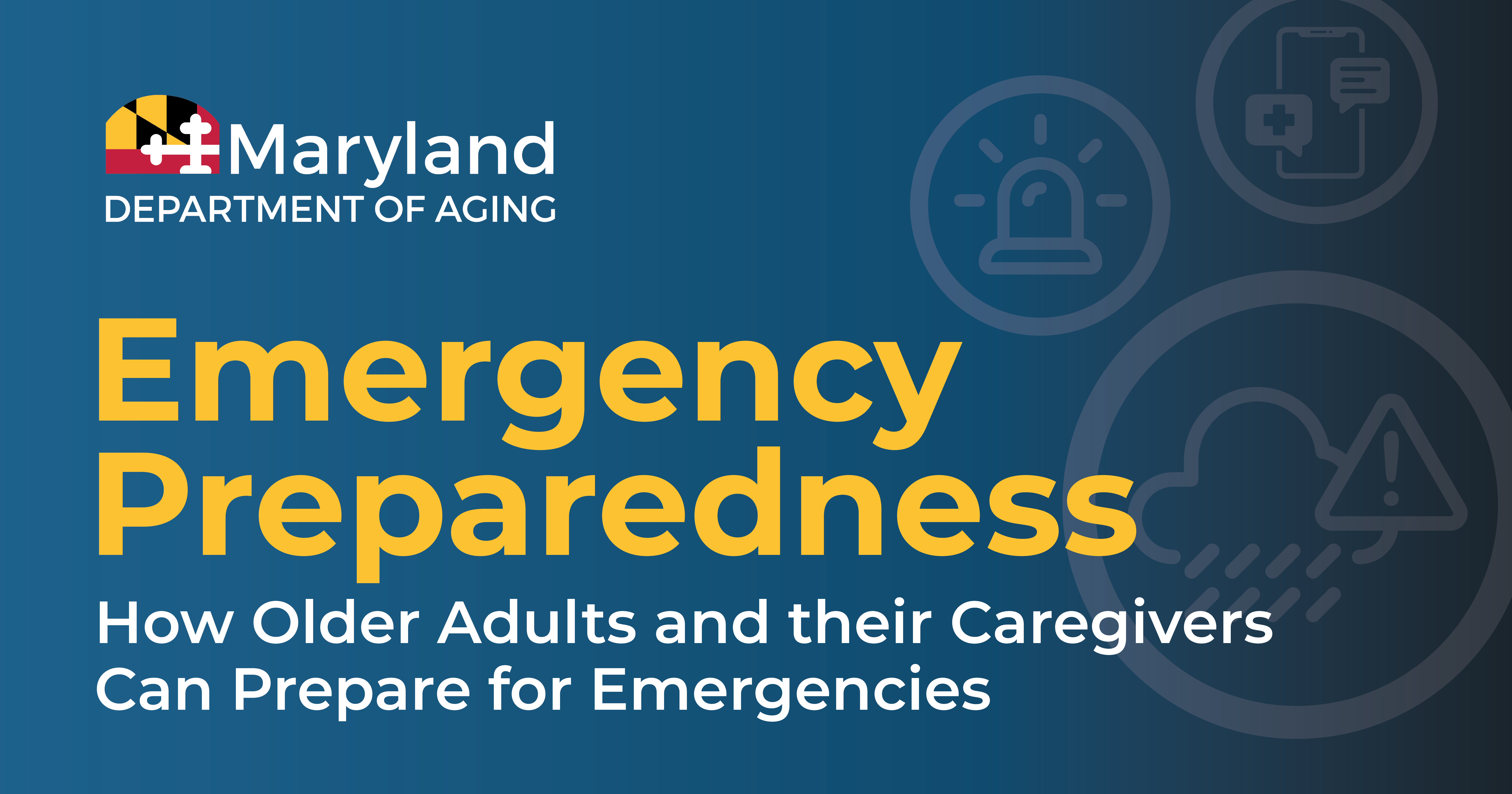
Older adults and people with disabilities need to plan ahead for the unexpected. Weather-related emergencies, power outages, and road closures are challenging for anyone. People with certain disabilities and other medical considerations need to create a plan that takes into account their specific needs.
Governor Moore Declares State of Emergency Ahead of Winter Weather System
On January 23, Governor Wes Moore declared a State of Emergency due to the major winter storm and dangerously cold temperatures expected to impact Maryland beginning Saturday, January 24. The storm will bring hazards including heavy snow, ice, and wind chills near or below zero across the entire State. Travel will be hazardous to near impossible, and at times may be life-threatening, throughout the weekend. Marylanders are urged to avoid travel, to follow local forecasts, and to make preparations ahead of the storm’s impact. Read more at https://governor.maryland.gov/news/press/pages/Governor-Moore-Declares-State-of-Preparedness-Ahead-of-Winter-Weather-System.aspx.
Find a Warming Center Near You
Exposure to extreme cold can cause hypothermia, a dangerous drop in core body temperature, and other cold-related illnesses. Space heaters may offer limited relief, but they often aren’t enough during extreme temperatures. It’s essential to find a place with proper heating to stay safe and comfortable.
Find your local warming center: https://health.maryland.gov/preparedness/Documents/2312_OPR_LocalWarmingCenter.pdf
Important considerations when planning for periods of extreme temperature:
- Don't wait until you are experiencing medical issues due to extreme temperatures before moving to a safer location. Play it safe and leave early.
- If transportation is an issue, plan ahead for someone you can call for a ride, or install a rideshare app on your phone and learn how to use it
before you need it.
- If you are using space heaters, make sure to keep anything that can burn—blankets, curtains, rugs, and even furniture—at least 3 feet away from the heater on all sides; never use an extension cord or power strip with a space heater; always turn your heater off and unplug it when you leave the room or go to sleep.
- Check your smoke alarms! Cold weather is the most important time to make sure your batteries are fresh and your alarms are working.
Power outages
If you rely on energy-dependent medical equipment, power outages can be a real concern. Knowing how much power you have left on a charged device, and where to go to access power when you need it is important.
If a power outage occurs, move to a warming center as soon as possible. If possible, don't tie up 911 emergency lines if you lose power. Intead, call your local utility company's emergency number, which can be found at https://mdem.maryland.gov/Pages/Power-Outages.aspx
Check on Your Neighbor
As the snow piles up and temperatures drop, a quick check-in can be a lifesaver for our older neighbors. Winter storms can lead to isolation, power outages, and dangerous conditions. If you can safely walk there, knock on the door. If not, give them a quick call. Rather than asking, "Are you okay?", try asking, "What are you planning for dinner?" or "How is the temperature in your living room?" If possible, help them stay safe by clearing a small path to their door or mailbox to prevent dangerous slips and falls and ensure they have access to their medications and enough water in case pipes freeze.
Emergency evacuations
Extreme weather and other environmental emergencies can make it necessary to leave your home on very short notice. Creating a plan ahead of time can keep you safer in an emergency and help you prepare for an evacuation.
Prepare an emergency kit that includes:
- Non-perishable food and water for you and your pets
- Medications and medical supplies
- Insurance cards and identification cards
- Contact information for your family, friends, and medical professionals
- Assistive, medical, and communications devices, batteries, and chargers
Prepare an evacuation plan that includes:
- Talking to your doctor about how to prepare for an emergency evacuation
- Methods of transportation and places to go
- Communicating with family and emergency contacts about your evacuation plan and any related needs
If you are in imminent danger, always call 911 first!
Know your zone to be prepared for hurricane season
Hurricane season runs from June 1 through November 30. The 2024 season was the third most expensive on record, with high activity and several Category 5 hurricanes. Due to warm sea temperatures and the ongoing La Niña system, the National Weather Service predicts an above-average 2025 season, expecting 14 to 21 named storms, with three to six major hurricanes at a Category 3 or higher. Download the Maryland Department of Emergency Management Hurricane Evacuation Guide.
Because large storms are unpredictable and can require rapid evacuations, it is essential to have an emergency plan in place, disaster supply kits ready, and to Know Your Zone to find out if you live in one of Maryland’s designated coastal evacuation zones. Find your zone at Know Your Zone Maryland.
National Resources for Emergency Preparedness